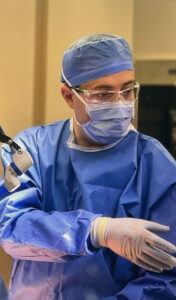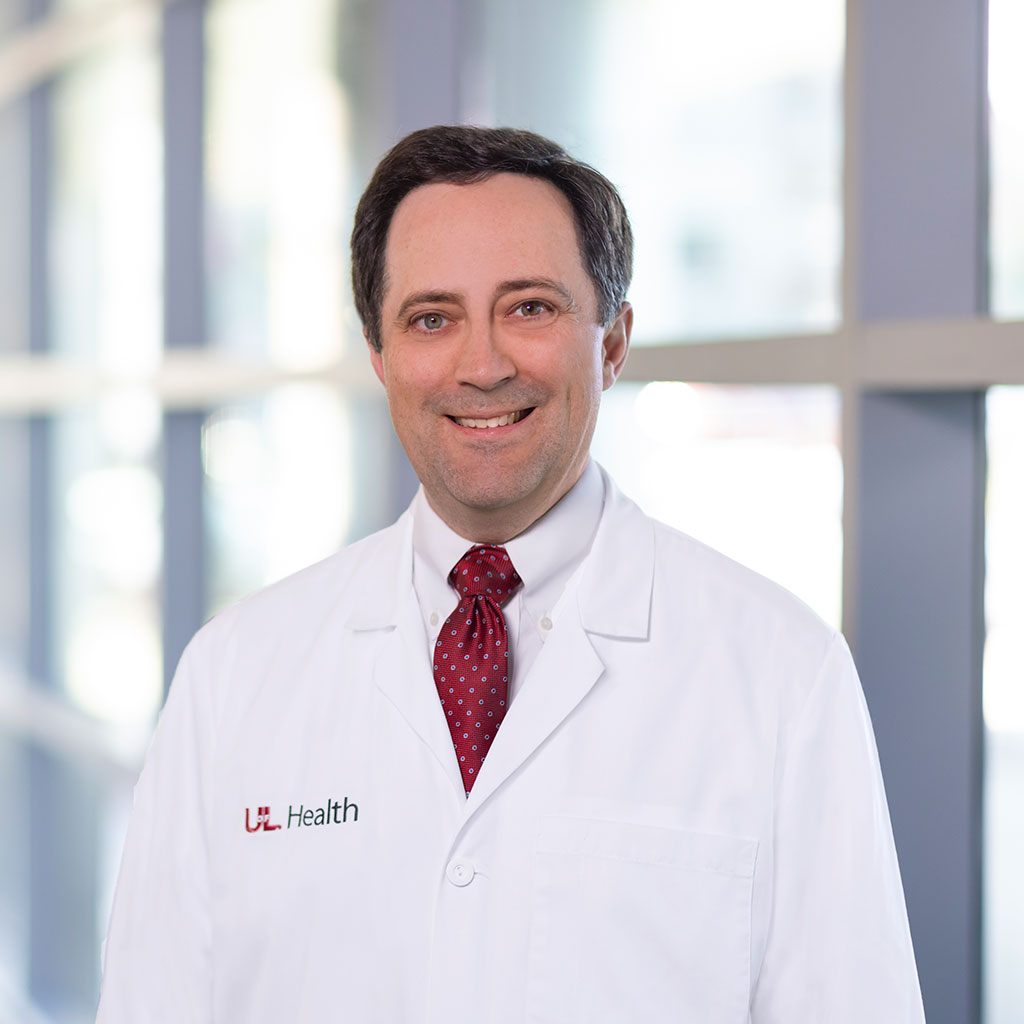Choosing to treat cancer patients was a clear choice for UofL Health’s surgical oncologist Michael Egger, MD
LOUISVILLE Some people know at a very early age what they want to be when they grow up. Others stumble into a profession that suits them or maybe try several before they find the right one. By the time he was a senior in high school, Michael Egger, MD, surgical oncologist specializing in cancers of the gastrointestinal tract and melanoma at UofL Health – Brown Cancer Center, knew what he wanted to do.
Egger was born in Rock Island, Illinois, but his family moved to Louisville when he was two, and then to Nashville when he was in middle school. His father worked for Humana and his mother was a nurse, so a medical career was already on his mind. What happened next solidified his plans.
“My mom was diagnosed with breast cancer the summer before I started my senior year in high school,” says Egger, who is also associate professor of surgery at the University of Louisville School of Medicine. “That was a significant change in our lives for a year as she underwent all the treatments.”
His mother beat the cancer and went back to school to become a nurse practitioner before recently retiring. Egger graduated from the University of the South, then went to Emory University in Atlanta for medical school, with an eye on becoming a surgical oncologist. He and his wife Rachael both graduated from Emory in 2008 – he from medical school and she from physical therapy school.
Egger spent the next seven years at UofL, completing five years of surgical training and two years of surgical oncology research. From 2015-2017, he did a surgical oncology fellowship at the University of Texas MD Anderson Cancer Center in Houston. Upon completing his fellowship in Houston, Egger and Rachael returned to Louisville and to UofL Health in 2017.

“We wanted to raise our family here and I wanted to be part of UofL, at the cancer center
that had a lot to do with my maturation as a surgeon when I trained here,” Egger says. “The opportunity to conduct research and to teach were big reasons why I wanted to come back.”
Egger was also drawn to the opportunity to work with the UofL’s School of Public Health and Information Sciences, where he could explore his interest in research. He now works with the School of Public Health’s biostatisticians, data scientists, and population health experts analyzing how healthcare is delivered.
“We work with health economists looking at how do we deliver cost-effective care; what are the gaps in care delivery; how do patients access high-quality, comprehensive multidisciplinary cancer care,” Egger says, noting that they are currently working on a nationwide research project funded by the American Cancer Society.
A Full and Satisfying Work Week
Egger devotes two or three days a week to surgery and one day in clinic. The remaining time is split between research, working with the quality department at UofL, or teaching. Egger points to the multidisciplinary setting as one of the main reasons he wanted to come back to UofL.
“The things I most heavily rely on at the Brown Cancer Center are the additional support systems that we have — social work support and our dieticians helping our patients with nutrition support that has been particularly important for GI cancers,” Egger says. “There are challenges to making sure they are getting the appropriate nutrition that they need to get through the cancer treatments. We have a great team that can help with that.”
Egger also works closely with Brown Cancer Center’s cancer rehab specialists, who also practice the concept of “pre-habilitation.” “Sometimes our patients are getting either chemotherapy or radiation therapy prior to undergoing surgery,” Egger says. “Rather than sitting on our hands and not doing anything, we get them working with our cancer rehab specialists and physical therapists to get them strong or maintain their fitness so that they are ready to undergo the operation they need.”
Gastrointestinal Cancer in Kentuckiana
Cancer of gastrointestinal organs is a major public health concern in Kentucky. Egger notes that Kentucky ranks among the top 10 to 15 in the nation in colorectal, pancreas, liver, bile duct, and stomach cancers.
Egger is often the first cancer specialist the patient sees. It is not easy to deliver the news to patients about any of these cancers and the challenges of beating them.
“As a surgeon, I’m trying to figure out if surgery is appropriate for them,” Egger says. “We’re trying to determine what stage they have and if we have a firm diagnosis or if we need more biopsies. We have to decide if surgery is appropriate for the kind of disease they have and if they can handle the operation from a medical comorbidity standpoint.” While the next steps are vital, Egger’s primary focus in those initial patient meetings is to try to understand the impact of the diagnosis on the patient.
“Cancer is one of the things that people really fear in life. We are around this every day. It becomes our day in, day out. If we’re not aware of it, we can be sort of numb or desensitized to just how powerful and profound that word can be to patients,” Egger says. “I challenge myself and our trainees to understand how challenging, how upsetting this experience can be for our patients. I think our job is also to instill confidence — for them to know that this is not the first time that we have done this.”
AI and Advancements in Gastrointestinal Cancer Care
Egger can also provide hope thanks to the continual advancements in gastrointestinal cancer care. He points to minimally invasive surgery and resulting reduction of surgical complications and improved recovery. Additional advancements of systemic therapies including immunotherapy can even eliminate the need for some surgeries.
“Less surgery and less invasive surgeries are the major advances we have made,” Egger says of the changes in cancer treatment. “I think AI will help us get a handle on the vast amount of information we have that simply cannot be consumed and interpreted by any normal human being. The medical literature is now so vast that there is now a study for almost every clinical situation you may encounter, but the challenge is finding it and applying the lessons from that study to your patient. AI is going to help us get to this personalized medicine

approach where we can understand the data that is out there and apply it to the patient.” AI promises to be an increasingly powerful tool in the treatment of cancers and other diseases. It will not, however, replace the human element of care.
“We still need to be the face of patient care,” Egger says. “In the end, you’re going to be looking the patient in the eye and offering an operation and promising to take care of them. That’s a responsibility that I don’t think AI can replace.”
Caring for the Individual
Not all patients can be cured. Not every story has a happy ending. But Egger understands that every moment matters and tries to help terminal patients meet whatever final goals they might have.
“Some of the cases that have stuck with me most are taking care of patients at the end of their life and understanding their goals and helping patients be well enough to attend a wedding or somebody’s graduation,” he says. “I had a young patient who really wanted to get to prom, so we did everything we could to get them out of the hospital so they could get to prom. Sometimes that is all you can do. Understanding what the patient’s goals are and how you can get them to that goal can be just as rewarding as curing a cancer.
“The patients are the reason I do this. You see them on some of the worst days of their life. I take the responsibility very seriously to help them through that. One of the great things about being a surgical oncologist is that I can see patients throughout their journey. To develop those relationships with them, to see them move through different phases of their life, to help them on some of the worst days of their life, that’s why I do this.”




